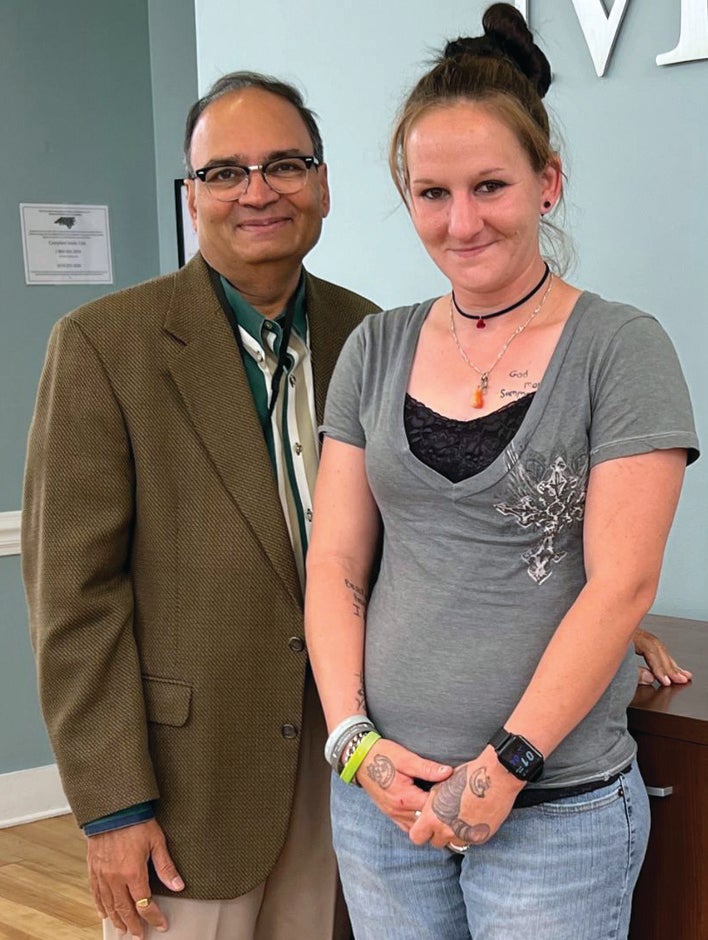Resident pursues mental health resources at Monarch
Editor’s Note: The following article was written by Monarch and is used with permission of the patient.
When Albemarle resident Billie Jean Bergquist didn’t know where to turn during difficult times of her life, she turned to drugs. When she realized this behavior was no longer helping her cope with traumatic life experiences, she turned to Monarch.
Billie Jean Bergquist, 32, reached out to Monarch for help when she faced difficult crossroads in her life because of substance use disorder (SUD) and mental illness.
At each of those turns, services and supports were in place to help her heal.
Her journey throughout her young life was difficult. At the age of 12, she was raped. She didn’t tell anyone.
Her teen years were marred with cutting herself, smoking marijuana and using illegal drugs. She experimented with drugs in hopes of being free of the pain she was feeling as the result of childhood trauma.
Eventually, others in her life showed her how to add cocaine, heroin and opioids to the array of substances she was already using.
Drugs would only provide a temporary relief, she admits. When the high wore off, she felt shame, embarrassment, hopelessness.
The cycle would begin all over again. She left home at 17, became pregnant and lived with her baby’s father. She was clean from drugs for a while but eventually drifted back when caring for a young child and fighting the wish to feel numb became overwhelming.
“I did everything and anything I could get my hands on,” she recalls about substances she used.
Her dad passed away six months after her son was born and she realized it affected her deeply. She turned to drugs to help numb the pain. Through the early years of her son growing up, she drifted in and out of sobriety. For a period of time, her young son resided with a family member because of her drug use. She knows what it feels like to experience homelessness.
Throughout her 20s, she turned to Monarch for help, each time hoping to pursue recovery and end the pain she was feeling. In 2019, she walked through the doors one more time and was welcomed without judgement or made to feel embarrassed that she was again reaching out for help.
Since then, she has been working to maintain a drug-free life. She will admit that the road she is traveling has been bumpy and her recovery challenging.
“I couldn’t ask for a better place to go to get help. They really want to help people if you listen and put what they say to work, it works,” she explains of the services she receives from Monarch.
She uses Medication-Assisted Treatment (MAT), which is the use of medications in combination with counseling and other therapy to treat SUDs; individual and group behavioral health therapy; and Individual Placement and Supports (IPS), a person-focused, behavioral health service with employment supports.

Billie Jean Bergquist, right, is shown with Shailesh Gandhi, employment support professional with Monarch’s IPS, who is assisting her with establishing a plan to start her own cleaning business. (Contributed)
Monarch staff who assist her in receiving treatment include Employment Support Professional Shailesh Gandhi; Behavioral Health Therapist Crystal Neal, LCMHC-A, LCAS-A; and Medical Director Dr. Robert McHale, M.D., M.Sc., DFAPA, ABPM, FASAM.
McHale explains that removing the substance use is one part of seeking mental health treatment.
“Part of the recovery process is removing the substance use and that is the beginning. It is important to engage in treatment for the trauma so those underlying issues can be resolved. If not treated, the chance of recurrence will re-emerge,” he explains, noting that an SUD allows a person, for a time, to escape the trauma.
He applauds her for continuing to seek treatment and recovering through a variety of services.
“She is going about it in a good way and she is striving to make things better — learning about herself, growing, helping others.
She uses relapses as a learning experience.”
Bergquist is proud of her sobriety and grateful for the services from which she is benefitting.
“I didn’t know how to deal with things, and now with their help I am learning. Monarch is teaching me how to deal with things,” she says.
Focusing on her personal interests and making sure tools are in place to cope is an important aspect of recovery, she says. She has a “wellness shed” in her backyard based on the popular “she shed” concept.
She has decorated a small structure in her backyard where she spends time listening to motivational speakers on YouTube, reading the Bible or crafting. She leans on her family, including her mom, fiancé and children, for support.
Her sobriety has motivated her in a way she never dreamed. Future goals include becoming a peer support specialist and helping others pursue sobriety through sharing her own experiences; completing her GED; owning a cleaning business; and becoming a mental health therapist.
What would she say to others struggling to overcome an SUD or mental illness?
“Just because it is bad now it will get better,” she said. “You have to get through the storm so you will know how wonderful the sunshine feels because if it were always sunny you would take it for granted.”
For more information about Monarch services, call 866-272-7826.

